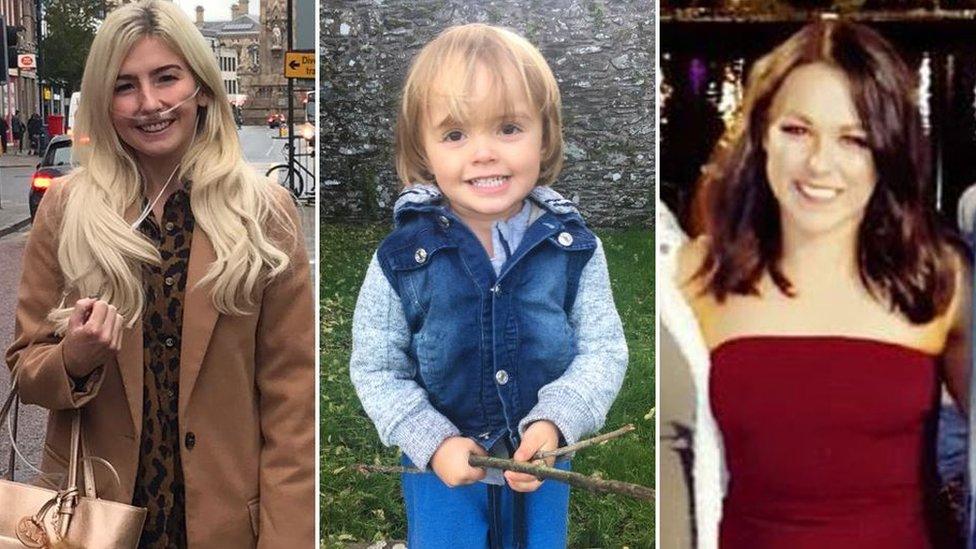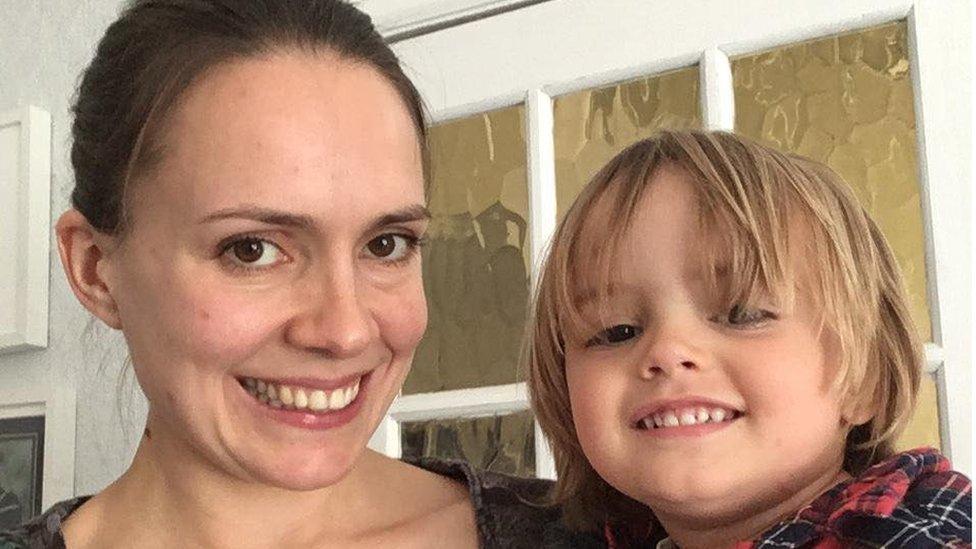Cystic fibrosis Orkambi drug will 'transform lives' of young people
- Published

Nicole Adams, Lorcán Maguire and Rachel McHugh welcome news of Orkambi's approval for cystic fibrosis suffers in Northern Ireland
The lives of young people with cystic fibrosis will be "transformed" by a life-extending drug approved to treat the condition, campaigners have said.
On Tuesday, the Department of Health confirmed its intention to make Orkambi available in Northern Ireland.
It improves lung function in those with cystic fibrosis - a life-shortening genetic condition that can cause fatal lung damage.
Approximately one in 2,500 babies born in the UK has cystic fibrosis.
Only about half of those with the condition live to the age of 32.
Orkambi does not work for all patients, but two other drugs to treat cystic fibrosis symptoms, Symkevi and Kalydeco, will also be made available in Northern Ireland.
Symkevi is restricted to over 12-year-olds, while Kalydeco can be used from 12 months.
All three drugs are made by Vertex and Department of Health Permanent Secretary Richard Pengelly said following an agreement with NHS England, the company "must make the drugs available to Northern Ireland patients on equivalent terms".
He said: "Discussions are being commenced with Vertex Pharmaceuticals and subject to that localised agreement being formally signed off, we will be able to start commissioning the drugs as a matter of urgency."
Families have campaigned for Orkambi since 2015, when it was licensed to treat certain cystic fibrosis patients.
The drug can be given to children as young as two.
The drug, which costs approximately £104,000 a year per patient, was deemed too expensive by the health advisory body, NICE.
A confidential deal was struck by NHS England with the manufacturers Vertex Pharmaceuticals, on Thursday, while in September the Scottish Government reached an agreement.
Jen Banks, whose two-year-old son Lorcán was diagnosed with cystic fibrosis shortly after birth, is among campaigners who have welcomed the news as the "best Christmas present ever".
Ms Banks, from Downpatrick, County Down, said her family had "lived under a cloud" throughout Lorcán's life.
She said the future seemed "dark" but the availability of Orkambi would be "life-transforming" for him and others.
"Orkambi has the potential to save the lives of people who are desperately ill and to give children the chance of a normal life," she said.

Jen Banks and her son Lorcán
"This will transform care for cystic fibrosis. It will be remarkable not having to freak out about Lorcán catching a cold.
"Knowing that this drug will extend his life allows me to think about a time when Lorcán is at school and there is very little difference between him and the majority of his classmates.
"It is tragically sad that lives were lost waiting for this to happen."
Liam McHugh, from County Tyrone, has campaigned for Orkambi to be made available on the NHS since his daughter Rachel's life was "totally transformed" by the drug.
Rachel, 27, was given Orkambi as part of a clinical trial in 2013 and remains on the drug today.
Mr McHugh said Rachel faced repeated hospitalisations before Orkambi, and when she took a cold it was "panic stations" as it would develop into chest infections.
He said her health had dramatically improved.

Rachel McHugh with her parents Eleanor and Liam
"I know how good these drugs are after transforming Rachel's life. We need this for everybody," he said.
"Orkambi could add decades to peoples' lives. The Cystic Fibrosis community could have the best Christmas present ever."

Cystic Fibrosis
Cystic fibrosis is an inherited condition in which the lungs and digestive system can become clogged with thick, sticky mucus.
It can cause problems with breathing and digestion from a young age.
Some of the main symptoms of cystic fibrosis can include recurring chest infections, difficulty putting on weight and frequent, wet-sounding coughs.
There's currently no cure for cystic fibrosis, but a number of treatments are available to help control the symptoms
The condition can be fatal if it leads to a serious infection or the lungs stop working properly.

Nicole Adam, 28, from Newtownabbey, County Antrim, is excited by the prospect of Symkevi being introduced alongside Orkambi.
She was granted Orkambi on compassionate grounds when her health deteriorated after she contracted a rare drug-resistant bacteria, but had to stop taking it due to side effects.
Nicole said Symkevi offered her the chance to stabilise her condition.

Nicole Adams during a recent hospital stay
"Orkambi did not help me, but that does not mean it won't help others and I realise that," she said.
"Symkevi is my path to lead a happier and healthier life.
"It would mean I would no longer live in fear that I won't have a future. It would mean I could travel and not have to worry about being too ill.
"I could have the little family I've always dreamt of."
David Ramsden, chief executive at the Cystic Fibrosis Trust, welcomed the news and said the campaign had been "a hard-fought battle".
"But the fight doesn't end until all four nations in the UK have access, we won't stop until Wales have a deal," he added.
- Published24 October 2019

- Published24 October 2019
